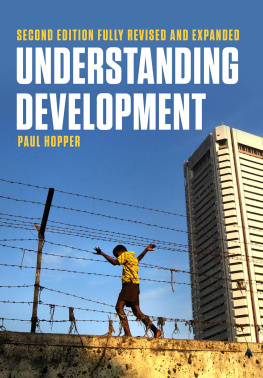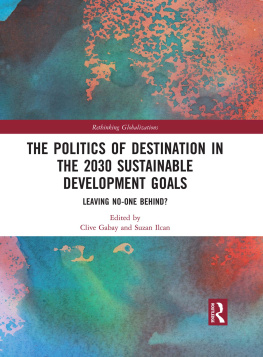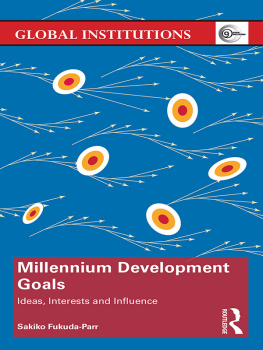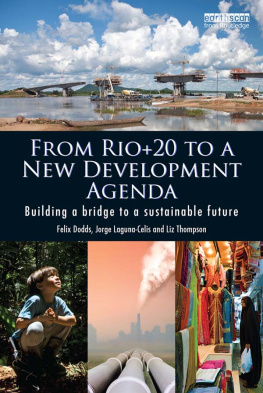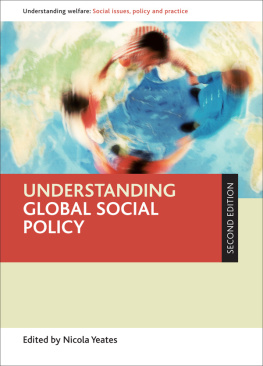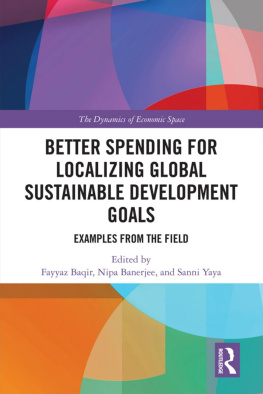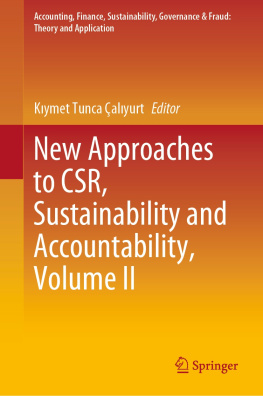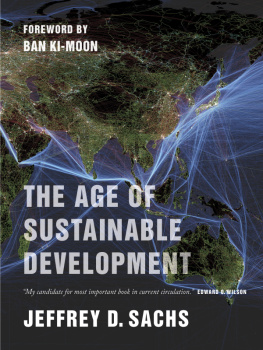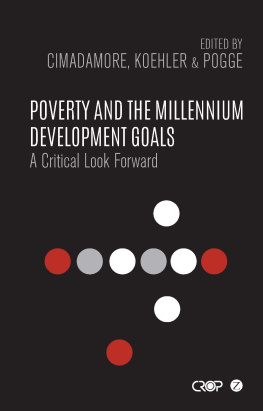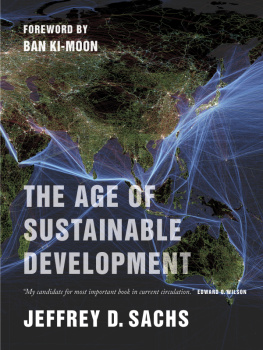Contents
Figures
Boxes
Guide
Pages

For Mum, Shaun, Tracey, Emma and Anna
and in memory of my Dad
Understanding Development
Issues and Debates
Second edition
PAUL HOPPER
polity
Copyright Paul Hopper 2018
The right of Paul Hopper to be identified as Author of this Work has been asserted in accordance with the UK Copyright, Designs and Patents Act 1988.
First edition published in 2012 by Polity Press
This second edition published in 2018 by Polity Press
Polity Press
65 Bridge Street
Cambridge CB2 1UR, UK
Polity Press
350 Main Street
Malden, MA 02148, USA
All rights reserved. Except for the quotation of short passages for the purpose of criticism and review, no part of this publication may be reproduced, stored in a retrieval system or transmitted, in any form or by any means, electronic, mechanical, photocopying, recording or otherwise, without the prior permission of the publisher.
ISBN-13: 978-1-5095-1054-2
A catalogue record for this book is available from the British Library.
Library of Congress Cataloging-in-Publication Data
Names: Hopper, Paul, 1963- author.
Title: Understanding development / Paul Hopper.
Description: Malden, MA : Polity Press, 2018. | Includes bibliographical references and index.
Identifiers: LCCN 2017021116 (print) | LCCN 2017023716 (ebook) | ISBN 9781509510535 (Mobi) | ISBN 9781509510542 (Epub) | ISBN 9781509510504 (hardback) | ISBN 9781509510511 (pbk.)
Subjects: LCSH: Economic development. | Sustainable development. | Social policy. | Commercial policy. | Emigration and immigration.
Classification: LCC HD82 (ebook) | LCC HD82 .H597 2018 (print) | DDC 338.9--dc23 LC record available at https://lccn.loc.gov/2017021116
The publisher has used its best endeavours to ensure that the URLs for external websites referred to in this book are correct and active at the time of going to press. However, the publisher has no responsibility for the websites and can make no guarantee that a site will remain live or that the content is or will remain appropriate.
Every effort has been made to trace all copyright holders, but if any have been inadvertently overlooked the publisher will be pleased to include any necessary credits in any subsequent reprint or edition.
For further information on Polity, visit our website:politybooks.com
Preface to the Second Edition
This revised and expanded edition of Understanding Development incorporates the key recent events and trends that are shaping international development, such as international migration, humanitarianism, population displacement, the global refugee crisis, the rise in the number of fragile states and the contested nature of trade and trade deals. This second edition also covers development in relation to global policy formation, focusing on the end of the UN Millennium Development Goals in 2015 and the start of the UN Sustainable Development Goals, which will run until 2030. Three new chapters are added to this second edition dealing with these matters. However, the book builds on the framework of the original edition which presented a comprehensive introduction to the multidimensional and evolving nature of international development.
Acknowledgements
I am extremely grateful to Dr Louise Knight and Nekane Tanaka Galdos, and their colleagues at Polity Press, for their helpful advice and professional assistance at every stage in the production of the second edition of this book. I would also like to thank my anonymous reviewers who provided me with extensive notes on my manuscript and much to think about. Tony Inglis, my co-director at the Future Policy Organisation, and my brother, Shaun Hopper, helped me with the design of the graphics. My students on the BA (Hons) Globalisation: History, Politics, Culture and the MA Globalisation: Politics, Conflict and Human Rights at the University of Brighton deserve special mention both for allowing me to course-test this book and for their enthusiasm. I thoroughly enjoyed teaching and working with you all. As with my previous books, I dedicate this book to my family.
Acronyms and Abbreviations
| AAA | Accra Agenda for Action |
| AAPPG | Africa All Party Parliamentary Group |
| ACP | Africa, the Caribbean and the Pacific region |
| ADB | African Development Bank |
| ADF | African Development Fund |
| AFTA | ASEAN Free Trade Area initiative |
| AGE | advisory group of experts |
| AIDS | Acquired Immune Deficiency Syndrome |
| AIIB | Asian Infrastructure Investment Bank |
| AOAV | Action on Armed Violence |
| ART | anti-retroviral therapy |
| ARV | anti-retroviral |
| ASEAN | South East Asian Nations |
| ASI | Adam Smith Institute |
| ATPC | African Trade Policy Centre |
| AU | African Union |
| BNA | Basic Needs Approach |
| BRICS | Brazil, Russia, India, China and South Africa |
| BWIs | Bretton Woods Institutions |
| CAP | Common Agricultural Policy |
| CAR | Central African Republic |
| CBDR | common but differentiated responsibilities |
| CBOs | community-based organizations |
| CFCs | chlorofluorocarbons |
| CGD | Commission on Growth and Development |
| CHS | Commission on Human Security |
| CPEs | complex political emergencies |
| CSD | Commission on Sustainable Development |
| CSOs | civil society organizations |
| DAC | Development Assistance Committee |
| DAWN | Development Alternatives with Women for a New Era |
| DDR | disarmament, demobilization and reintegration |
| DFID | UK Department for International Development |
| DPKO | UN Department of Peacekeeping Operations |
| DRR | disaster risk reduction |
| ECLA | Economic Commission for Latin America |
| ECLAC | Economic Commission for Latin America and the Caribbean |
| ECOSOC | United Nations Economic and Social Council |
| EFA | Education for All |
| EJM | environmental justice movement |
| EPAs | Economic Partnership Agreements |
| ERM | European Exchange Rate Mechanism |
| ESAF | Enhanced Structural Adjustment Facility |
| EU | European Union |
| FDI | foreign direct investment |
| FFD3 | Third Financing for Development summit |
| FIDES | Fonds dInvestissement pour le Dveloppement Economique et Social |
| FLO | Fairtrade Labelling Organizations International |
| FTAs | free trade agreements |
| G-77 | Group of 77 countries |
| G8 | Group of 8 countries (Canada, France, Germany, Italy, Japan, Russia, the United Kingdom and the United States) |
| G20 | Group of 20 countries. |
| GAD | Gender and Development |
| GATT | General Agreement on Tariffs and Trade |

